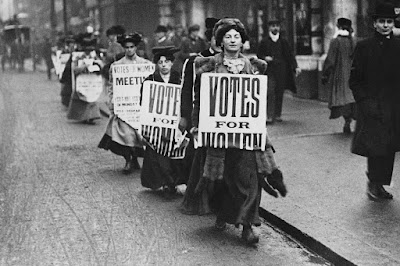 [manifestação pelo voto feminino
[manifestação pelo voto femininoLondres, início do século XX
https://www.the-unedit.com]
artigo:
Carlomagno, M. & Codato, A., 2018.
Profissão, sexo e dinheiro: mensuração da acumulação de desigualdades na competição eleitoral brasileira.
Colombia Internacional, (95), pp.79–107.
DOI 10.7440/colombiaint95.2018.04
Abstract
This article is based on Robert Dahl´s argument that inequalities among different social groups in polyarchies tend to be non-cumulative. We investigate the question of whether this hypothesis applies to candidates for the post of State congressman in Brazil. The corpus of the study consists of 38, 278 candidates in 27 federal government units between 2002 and 2004, which covers four elections. As a dependent variable, we examine the amounts of campaign funds that were raised, and, as an explanatory variable, show that two social divisions were at work: the profession or occupation of the candidates, categorized by a model of willingness to enter politics, and the sex of the candidates. Average difference tests and a regression model show that social position (profession) is the biggest predictor of the political campaign recipe. However, between 2002 and 2010, those inequalities became more pronounced.
download
http://bit.ly/2Jz2x0w
Research Gate
http://bit.ly/2JyExKR
Academia.edu
[pdf]
.
 orcid.org/0000-0002-5015-4273
orcid.org/0000-0002-5015-4273















Nenhum comentário:
Postar um comentário